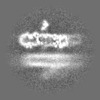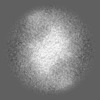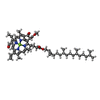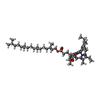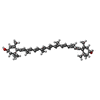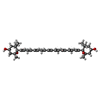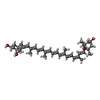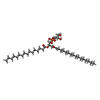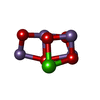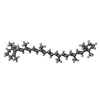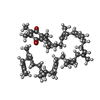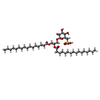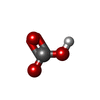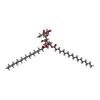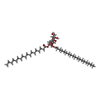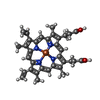[English] 日本語
 Yorodumi
Yorodumi- EMDB-10865: PSII-LHCII C2S2 supercomplex from Pisum sativum grown in high lig... -
+ Open data
Open data
- Basic information
Basic information
| Entry | Database: EMDB / ID: EMD-10865 | |||||||||
|---|---|---|---|---|---|---|---|---|---|---|
| Title | PSII-LHCII C2S2 supercomplex from Pisum sativum grown in high light conditions | |||||||||
 Map data Map data | PSIILHCII C2S2 supercomplex in high light condition | |||||||||
 Sample Sample |
| |||||||||
| Function / homology |  Function and homology information Function and homology informationplastoglobule / photosynthesis, light harvesting in photosystem I / photosystem II oxygen evolving complex / photosystem II assembly / oxygen evolving activity / photosystem II stabilization / photosystem II reaction center / photosystem II / chloroplast envelope / oxidoreductase activity, acting on diphenols and related substances as donors, oxygen as acceptor ...plastoglobule / photosynthesis, light harvesting in photosystem I / photosystem II oxygen evolving complex / photosystem II assembly / oxygen evolving activity / photosystem II stabilization / photosystem II reaction center / photosystem II / chloroplast envelope / oxidoreductase activity, acting on diphenols and related substances as donors, oxygen as acceptor / photosystem I / photosynthetic electron transport chain / response to herbicide / photosystem II / photosynthetic electron transport in photosystem II / chlorophyll binding / photosynthesis, light reaction / chloroplast thylakoid membrane / electron transporter, transferring electrons within the cyclic electron transport pathway of photosynthesis activity / phosphate ion binding / response to light stimulus / photosynthesis / electron transfer activity / protein stabilization / iron ion binding / heme binding / metal ion binding Similarity search - Function | |||||||||
| Biological species |  | |||||||||
| Method | single particle reconstruction / cryo EM / Resolution: 3.8 Å | |||||||||
 Authors Authors | Grinzato A / Albanese P / Zanotti G / Pagliano C | |||||||||
 Citation Citation |  Journal: Int J Mol Sci / Year: 2020 Journal: Int J Mol Sci / Year: 2020Title: High-Light versus Low-Light: Effects on Paired Photosystem II Supercomplex Structural Rearrangement in Pea Plants. Authors: Alessandro Grinzato / Pascal Albanese / Roberto Marotta / Paolo Swuec / Guido Saracco / Martino Bolognesi / Giuseppe Zanotti / Cristina Pagliano /  Abstract: In plant thylakoid membranes Photosystem II (PSII) associates with a variable number of antenna proteins (LHCII) to form different types of supercomplexes (PSII-LHCII), whose organization is ...In plant thylakoid membranes Photosystem II (PSII) associates with a variable number of antenna proteins (LHCII) to form different types of supercomplexes (PSII-LHCII), whose organization is dynamically adjusted in response to light cues, with the CS more abundant in high-light and the CSM in low-light. Paired PSII-LHCII supercomplexes interacting at their stromal surface from adjacent thylakoid membranes were previously suggested to mediate stacking. Here, we present the cryo-electron microscopy maps of paired CS and CSM supercomplexes isolated from pea plants grown in high-light and low-light, respectively. These maps show a different rotational offset between the two supercomplexes in the pair, responsible for modifying their reciprocal interaction and energetic connectivity. This evidence reveals a different way by which paired PSII-LHCII supercomplexes can mediate stacking at diverse irradiances. Electrostatic stromal interactions between LHCII trimers almost completely overlapping in the paired CS can be the main determinant by which PSII-LHCII supercomplexes mediate stacking in plants grown in high-light, whereas the mutual interaction of stromal N-terminal loops of two facing Lhcb4 subunits in the paired CSM can fulfil this task in plants grown in low-light. The high-light induced accumulation of the Lhcb4.3 protein in PSII-LHCII supercomplexes has been previously reported. Our cryo-electron microscopy map at 3.8 Å resolution of the CS supercomplex isolated from plants grown in high-light suggests the presence of the Lhcb4.3 protein revealing peculiar structural features of this high-light-specific antenna important for photoprotection. | |||||||||
| History |
|
- Structure visualization
Structure visualization
| Movie |
 Movie viewer Movie viewer |
|---|---|
| Structure viewer | EM map:  SurfView SurfView Molmil Molmil Jmol/JSmol Jmol/JSmol |
| Supplemental images |
- Downloads & links
Downloads & links
-EMDB archive
| Map data |  emd_10865.map.gz emd_10865.map.gz | 141.1 MB |  EMDB map data format EMDB map data format | |
|---|---|---|---|---|
| Header (meta data) |  emd-10865-v30.xml emd-10865-v30.xml emd-10865.xml emd-10865.xml | 38 KB 38 KB | Display Display |  EMDB header EMDB header |
| Images |  emd_10865.png emd_10865.png | 127.8 KB | ||
| Archive directory |  http://ftp.pdbj.org/pub/emdb/structures/EMD-10865 http://ftp.pdbj.org/pub/emdb/structures/EMD-10865 ftp://ftp.pdbj.org/pub/emdb/structures/EMD-10865 ftp://ftp.pdbj.org/pub/emdb/structures/EMD-10865 | HTTPS FTP |
-Validation report
| Summary document |  emd_10865_validation.pdf.gz emd_10865_validation.pdf.gz | 276.4 KB | Display |  EMDB validaton report EMDB validaton report |
|---|---|---|---|---|
| Full document |  emd_10865_full_validation.pdf.gz emd_10865_full_validation.pdf.gz | 275.5 KB | Display | |
| Data in XML |  emd_10865_validation.xml.gz emd_10865_validation.xml.gz | 6.7 KB | Display | |
| Arichive directory |  https://ftp.pdbj.org/pub/emdb/validation_reports/EMD-10865 https://ftp.pdbj.org/pub/emdb/validation_reports/EMD-10865 ftp://ftp.pdbj.org/pub/emdb/validation_reports/EMD-10865 ftp://ftp.pdbj.org/pub/emdb/validation_reports/EMD-10865 | HTTPS FTP |
-Related structure data
| Related structure data |  6yp7MC C: citing same article ( M: atomic model generated by this map |
|---|---|
| Similar structure data |
- Links
Links
| EMDB pages |  EMDB (EBI/PDBe) / EMDB (EBI/PDBe) /  EMDataResource EMDataResource |
|---|---|
| Related items in Molecule of the Month |
- Map
Map
| File |  Download / File: emd_10865.map.gz / Format: CCP4 / Size: 149.9 MB / Type: IMAGE STORED AS FLOATING POINT NUMBER (4 BYTES) Download / File: emd_10865.map.gz / Format: CCP4 / Size: 149.9 MB / Type: IMAGE STORED AS FLOATING POINT NUMBER (4 BYTES) | ||||||||||||||||||||||||||||||||||||||||||||||||||||||||||||||||||||
|---|---|---|---|---|---|---|---|---|---|---|---|---|---|---|---|---|---|---|---|---|---|---|---|---|---|---|---|---|---|---|---|---|---|---|---|---|---|---|---|---|---|---|---|---|---|---|---|---|---|---|---|---|---|---|---|---|---|---|---|---|---|---|---|---|---|---|---|---|---|
| Annotation | PSIILHCII C2S2 supercomplex in high light condition | ||||||||||||||||||||||||||||||||||||||||||||||||||||||||||||||||||||
| Projections & slices | Image control
Images are generated by Spider. | ||||||||||||||||||||||||||||||||||||||||||||||||||||||||||||||||||||
| Voxel size | X=Y=Z: 1.1 Å | ||||||||||||||||||||||||||||||||||||||||||||||||||||||||||||||||||||
| Density |
| ||||||||||||||||||||||||||||||||||||||||||||||||||||||||||||||||||||
| Symmetry | Space group: 1 | ||||||||||||||||||||||||||||||||||||||||||||||||||||||||||||||||||||
| Details | EMDB XML:
CCP4 map header:
| ||||||||||||||||||||||||||||||||||||||||||||||||||||||||||||||||||||
-Supplemental data
- Sample components
Sample components
+Entire : PSII-LHCII C2S2 supercomplex
+Supramolecule #1: PSII-LHCII C2S2 supercomplex
+Macromolecule #1: Chlorophyll a-b binding protein 8, chloroplastic
+Macromolecule #2: Photosystem II protein D1
+Macromolecule #3: Photosystem II CP47 reaction center protein
+Macromolecule #4: Photosystem II CP43 reaction center protein
+Macromolecule #5: Photosystem II D2 protein
+Macromolecule #6: Cytochrome b559 subunit alpha
+Macromolecule #7: Cytochrome b559 subunit beta
+Macromolecule #8: Photosystem II reaction center protein H
+Macromolecule #9: Photosystem II reaction center protein I
+Macromolecule #10: Photosystem II reaction center protein J
+Macromolecule #11: Photosystem II reaction center protein K
+Macromolecule #12: Photosystem II reaction center protein L
+Macromolecule #13: Photosystem II reaction center protein M
+Macromolecule #14: Oxygen-evolving enhancer protein 1, chloroplastic
+Macromolecule #15: Photosystem II reaction center protein T
+Macromolecule #16: Photosystem II reaction center protein W
+Macromolecule #17: Ultraviolet-B-repressible protein
+Macromolecule #18: Photosystem II reaction center protein Z
+Macromolecule #19: Light harvesting chlorophyll a/b-binding protein Lhcb4.3
+Macromolecule #20: Light harvesting chlorophyll a/b-binding protein Lhcb5, CP26
+Macromolecule #21: CHLOROPHYLL B
+Macromolecule #22: CHLOROPHYLL A
+Macromolecule #23: (3R,3'R,6S)-4,5-DIDEHYDRO-5,6-DIHYDRO-BETA,BETA-CAROTENE-3,3'-DIOL
+Macromolecule #24: (3S,5R,6S,3'S,5'R,6'S)-5,6,5',6'-DIEPOXY-5,6,5',6'- TETRAHYDRO-BE...
+Macromolecule #25: (1R,3R)-6-{(3E,5E,7E,9E,11E,13E,15E,17E)-18-[(1S,4R,6R)-4-HYDROXY...
+Macromolecule #26: 1,2-DIPALMITOYL-PHOSPHATIDYL-GLYCEROLE
+Macromolecule #27: CA-MN4-O5 CLUSTER
+Macromolecule #28: FE (II) ION
+Macromolecule #29: CHLORIDE ION
+Macromolecule #30: PHEOPHYTIN A
+Macromolecule #31: BETA-CAROTENE
+Macromolecule #32: 2,3-DIMETHYL-5-(3,7,11,15,19,23,27,31,35-NONAMETHYL-2,6,10,14,18,...
+Macromolecule #33: 1,2-DI-O-ACYL-3-O-[6-DEOXY-6-SULFO-ALPHA-D-GLUCOPYRANOSYL]-SN-GLYCEROL
+Macromolecule #34: BICARBONATE ION
+Macromolecule #35: DIGALACTOSYL DIACYL GLYCEROL (DGDG)
+Macromolecule #36: 1,2-DISTEAROYL-MONOGALACTOSYL-DIGLYCERIDE
+Macromolecule #37: PROTOPORPHYRIN IX CONTAINING FE
-Experimental details
-Structure determination
| Method | cryo EM |
|---|---|
 Processing Processing | single particle reconstruction |
| Aggregation state | particle |
- Sample preparation
Sample preparation
| Buffer | pH: 7 |
|---|---|
| Vitrification | Cryogen name: ETHANE |
- Electron microscopy
Electron microscopy
| Microscope | FEI TITAN KRIOS |
|---|---|
| Image recording | #0 - Image recording ID: 1 / #0 - Film or detector model: GATAN K2 BASE (4k x 4k) / #0 - Average electron dose: 40.0 e/Å2 / #1 - Image recording ID: 2 / #1 - Film or detector model: GATAN K2 BASE (4k x 4k) / #1 - Average electron dose: 40.0 e/Å2 |
| Electron beam | Acceleration voltage: 300 kV / Electron source:  FIELD EMISSION GUN FIELD EMISSION GUN |
| Electron optics | Illumination mode: FLOOD BEAM / Imaging mode: BRIGHT FIELD |
| Experimental equipment |  Model: Titan Krios / Image courtesy: FEI Company |
 Movie
Movie Controller
Controller







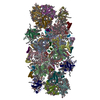




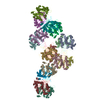
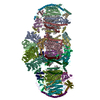
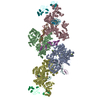
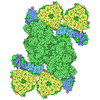
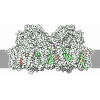

 Z (Sec.)
Z (Sec.) Y (Row.)
Y (Row.) X (Col.)
X (Col.)









